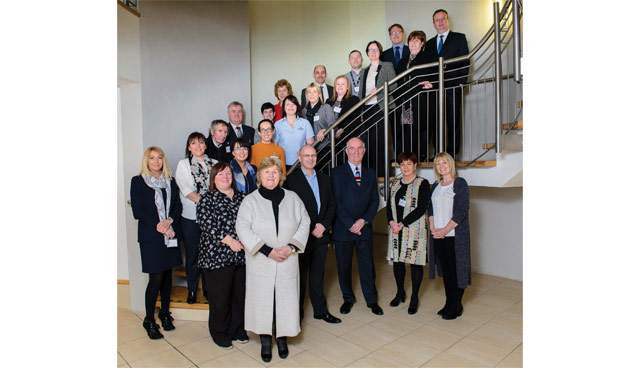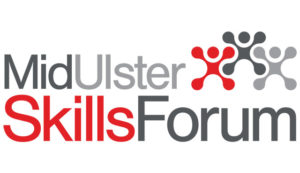Mid Ulster publishes skills plan with potential to create 2,355 jobs by 2021

A new plan to address the gap between skills demand and skills supply has the potential to create 2,355 new jobs by 2021 in the Mid Ulster region.
The employment creation opportunity has been identified in a major new research report by the Mid Ulster Skills Forum, the first industry-led body of its kind in Northern Ireland.
Established in 2017 by Mid Ulster District Council, the Forum has its roots firmly in both the Council’s progressive economic development strategy and the region’s Community Plan, with the partnership drawing its membership from local businesses, colleges, universities, enterprise agencies, key sectoral business organisations, government departments and the Council.
The Forum commissioned an in-depth scoping study to map the current skills base across businesses and to identify areas for action to match education and skills provision to the critical workforce needs of local employers.
Six key industrial sectors in Mid Ulster which account for 80 per cent of the area’s business base and 63 per cent of employment – manufacturing and engineering, construction, food and agri-food, retail, hospitality and IT – formed the focus of the research, revealing there is a deficit of skilled labour, with over 4,700 vacancies in 2016-2017.
A total of 71 per cent of businesses in the study indicated they have issues attracting appropriately qualified staff and 39 per cent also experienced issues retaining appropriately skilled staff, both of which were particularly prevalent in the manufacturing, engineering, food and agri-food sectors.
Reasons for an inadequate supply of applicants for jobs included competition within the labour market, a small local labour market, plus perceived lack of career prospects in the job/industry, not having a suitable means of transport, wages being less favourable or competitive and negative perceptions of the industry/sector.
Inadequate supply of applicants is compounded by wider macro factors such as relatively high rates of economic activity and employment levels and corresponding low levels of unemployment in the area.
Speaking at the October launch of the skills report and action plan, Chair of Mid Ulster District Council, Councillor Sean McPeake, says: “While we could look at the skills picture at a high level where the evidence confirms that there are substantial skills shortages, we could use only our informed opinion at a sub-regional level to account for what our businesses were experiencing on the ground here in Mid Ulster.
“In commissioning a skills study, the Forum was setting out to establish how Mid Ulster, the most entrepreneurial region here, with the highest concentration of businesses outside of Belfast, is going to maintain, sustain and grow its economic base in the current climate.”
The situation is, however, complex, with issues from the 4th industrial revolution to Brexit, influencing the skills landscape, as Councillor McPeake explains: “This is not as simple as saying we need x number of people trained in x jobs. We discuss employability and skills as part of a much more complex picture.
“This report is the first major piece of work to come from the Mid Ulster Skills Forum and the outworkings of the action plan have the potential to be transformational in terms of how we do two things: prepare people for the rapidly changing world of work and upskilling or reskilling those already in work.”
— Alan McKeown, Chair, Mid Ulster Skills Forum and Corporate Services Director of Dunbia, one of Europe’s largest processors of beef and lamb.
“There is the national policy direction where higher-level qualifications have traditionally been valued above vocational education and technical skills development.
“We are in the 4th industrial revolution, where technology and automation are changing how business, particularly manufacturing, works.
“There is Brexit and the uncertainty next March will bring in terms of supply, demand and free movement of people. In Mid Ulster, Brexit holds particular challenges, given any restrictions on migration and any withdrawal of mid and lower-skilled labour may exacerbate vacancy rates in lower-paid sectors such as hospitality, construction and food and agri-food, where 64 per cent of this sector’s employees originate from elsewhere in the EU.
“Nonetheless, we have an opportunity now to address the skills levels which are adversely impacting on our economy, currently and in the future.
“And to turn ambitions and aspirations into reality, this action plan has to be appropriately resourced, financed and implemented and that means strong partnerships are required on all fronts.
“Every single relevant organisation needs to commit to the plan, commit to ensuring that our platform for economic growth reflects a viable, evidence-based, business-driven, skills agenda.”
Alan McKeown, who chairs the Mid Ulster Skills Forum and is Corporate Services Director, Dunbia, one of Europe’s largest processors of beef and lamb, says: “This report is the first major piece of work to come from the Skills Forum and the outworkings of the action plan have the potential to be transformational in terms of how we do two things: prepare people for the rapidly changing world of work and upskilling or reskilling those already in work.
“I believe Mid Ulster is leading the way and can be an exemplar of how a high performing skilled workforce can ensure economic prosperity and the Skills Forum, as a collective, has the ability to drive this success.”
McKeown is clear, however, that the skills gap has implications for wider policy towards vocational provision: “We need to be clear and distinguish between qualifications and skills – we are definitely talking about a skills gap in Mid Ulster, and indeed, it is fair to say that this is not unique to us here, but is the experience across Northern Ireland and the UK.
“And if skills are recognised as a key productivity driver, then it is critical that we develop an education, skills and employment system that delivers the employability and technical skills needed to drive productivity in Mid Ulster’s growth sectors.”
The broad-ranging plan seeks to attract, develop, engage, retain and sustain a workforce for a successful economic future in Mid Ulster and identifies a series of priority actions, from enhancing the image and perceptions of key sectors, increasing the quality and quantity of apprenticeships, and improving engagement across education and employers to supporting technological change and innovation and securing resources and finance for the plan’s implementation.
 For more information about the Mid Ulster Skills Forum and the Skills Report and Action Plan, contact:
For more information about the Mid Ulster Skills Forum and the Skills Report and Action Plan, contact:
Fiona McKeown
Head of Economic Development
Mid Ulster District Council
T: 03000 132 132
E: fiona.mckeown@midulstercouncil.org
W: www.midulstercouncil.org/skills





